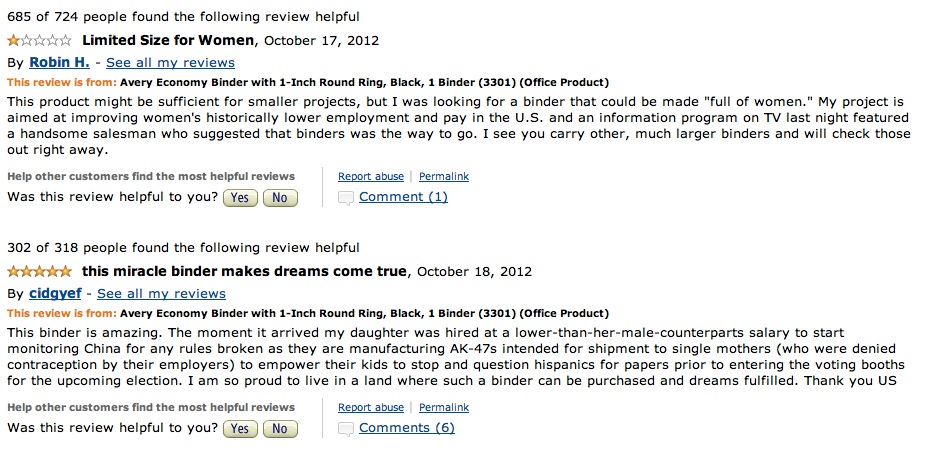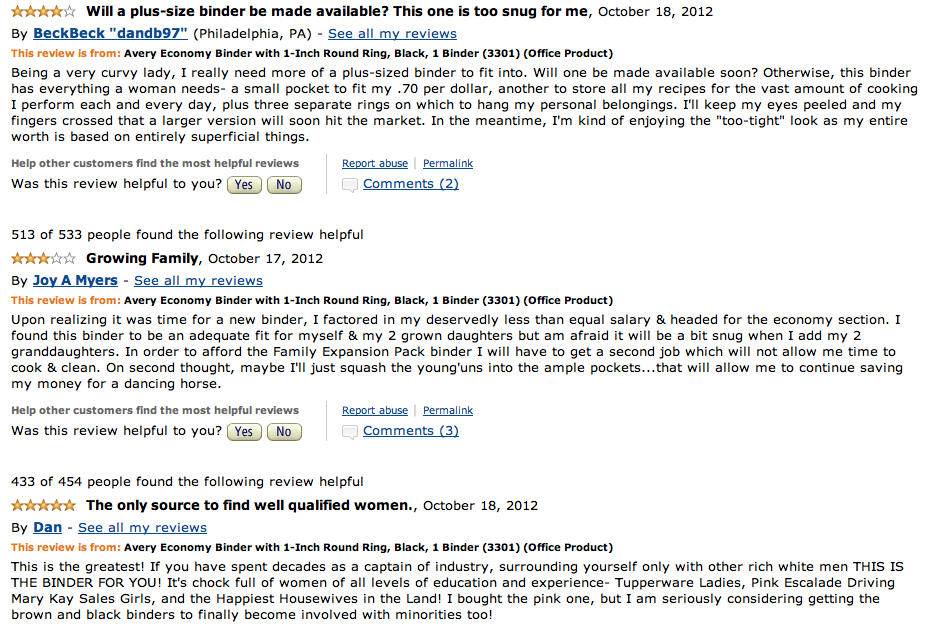Recently, I’ve noticed a creative and playful approach to subverting, challenging and resisting oppressive norms and the people, institutions or products that promote them: writing a critical/humorous review of a product online. How long has this been going on? I’m not sure, but I started to see them right after the second presidential debate and Romney’s “binders full of women” comment:
There were all sorts of excellent critical responses to Romney’s ridiculous comment; Tumblrs, twitter accounts, memes were created even before the debate was over. For a good overview, check out Binders Full of Women: Know Your Meme. While it was great to see so many different creative and critical ways in which to respond to Romney, I was particularly struck by the online reviews of binders on Amazon that playfully resisted and challenged Romney’s remark. Here are just a few, found on the review page for an Avery economy binder:
I scrolled through at least 8 pages of these and they were all reviews that explicitly addressed the Romney comment. Not all of the reviews offered a critical/feminist critique of women’s roles in the workforce, but most of them did, like these:

I should note that around page 24, Romney supporters/Obama critics began posting their responses. On the whole, these responses did not seem to adopt the humorous approach and were aimed directly at critiquing President Obama and not addressing or clarifying Romney’s extremely problematic record on women’s issues. Here’s an example:
Spending time this Monday morning looking through and thinking about these reviews, has made me curious and prompted to pose many questions.
Questions
How did this review intervention begin? Were the acts of resistance/critique spontaneous? Did the first review inspire others to leave their own “binders full of women” reviews?
What impact did/does/will these reviews have on voters, especially women voters?
Are these reviews forms of resistance? Are they, as Time Magazine’s article on them suggests, a snarky joke? How/when can snark and humor be used for critique and talking back?
Do Republican/Romney supporters engage in playful and humorous critiques of the debate? Where? How? What do these look like? What tone do they take?
What is the relationship between critical thinking and consumerism going on here? What do these reviews “do” to our understanding of consumerism and to our expectations concerning online stores and what we will find or do on them?
Why did people take up the “binders full of women” comment instead of Romney’s discussion about how women staffers could go home earlier so they’d have time to cook dinner? Would the latter have been more effective than the former in generating a critical and disruptive meme?
In general, I’m fascinated by the various playful responses to the Presidential debates. I’m still thinking through what I think of these reviews and the “binders full of women” meme. Here are a few of my tentative conclusions:
Tentative Conclusions
Without social media, especially Tumblr, where I first heard about then, I wouldn’t know about these resistant reviews. I’m sure they have shown up on twitter feeds and facebook timelines for lots of people too. While this might seem like an obvious point, it’s important to note the impact of social media on how many of us process, engage with and understand the Presidential election season. Social media can provide many of us (but not all) with access to alternative (as in, alternative to mainstream media’s talking heads and endless polls) sources and spaces for reading, producing and sharing content.
These resistant reviews enabled strangers to temporarily create a safe space for sharing frustrations about larger systemic problems concerning women and work and about Romney’s troubling approaches to women’s issues. On page 8, I found this review:

These spaces weren’t safe (anyone could read them and able to post their own snarky responses). However, they did provide a way to make visible the experiences and feelings of women who aren’t just resumes (objects) collected in a binder and who shouldn’t just be talking points for the candidates. In talking back through their reviews, these reviewers attempted to hold Romney accountable for the less-than-truthful (bullshit) claims that he was making and how they did/did not accurately reflect his past actions and his proposed policies as president.
These are not grand refusals, but, in the spirit of Michel Foucault, small acts of resistance that have the potential to subvert and disrupt. They become more significant when we think about them in the context of the wide range of ways that debate viewers (and followers of the debate through twitter or facebook), critically engaged with the debate.
Playful and humorous responses to the candidates like these reviews are an opportunity to have important conversations about the nature of resistance and its relationship to humor, how/where resistance is possible through social media, and how Romney and Obama address and think about women.
Note: This isn’t the first time that resistant reviews have shown up on Amazon. Reviewers also talked back to the Bic’s for Her Ballpoint Pen.


